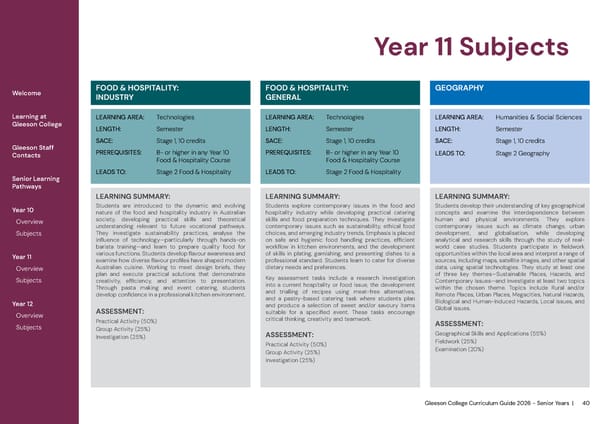Gleeson College Curriculum Guide 2026 - Senior Years | 40 Year 11 Subjects Welcome Learning at Gleeson College Gleeson Staff Contacts Senior Learning Pathways Year 10 Overview Subjects Year 11 Overview Subjects Year 12 Overview Subjects LEARNING SUMMARY: Students are introduced to the dynamic and evolving nature of the food and hospitality industry in Australian society, developing practical skills and theoretical understanding relevant to future vocational pathways. They investigate sustainability practices, analyse the influence of technology—particularly through hands-on barista training—and learn to prepare quality food for various functions. Students develop flavour awareness and examine how diverse flavour profiles have shaped modern Australian cuisine. Working to meet design briefs, they plan and execute practical solutions that demonstrate creativity, efficiency, and attention to presentation. Through pasta making and event catering, students develop confidence in a professional kitchen environment. ASSESSMENT: Practical Activity (50%) Group Activity (25%) Investigation (25%) FOOD & HOSPITALITY: INDUSTRY LEARNING AREA: Technologies LENGTH: Semester SACE: Stage 1, 10 credits PREREQUISITES: B- or higher in any Year 10 Food & Hospitality Course LEADS TO: Stage 2 Food & Hospitality FOOD & HOSPITALITY: GENERAL LEARNING AREA: Technologies LENGTH: Semester SACE: Stage 1, 10 credits PREREQUISITES: B- or higher in any Year 10 Food & Hospitality Course LEADS TO: Stage 2 Food & Hospitality LEARNING SUMMARY: Students explore contemporary issues in the food and hospitality industry while developing practical catering skills and food preparation techniques. They investigate contemporary issues such as sustainability, ethical food choices, and emerging industry trends. Emphasis is placed on safe and hygienic food handling practices, efficient workflow in kitchen environments, and the development of skills in plating, garnishing, and presenting dishes to a professional standard. Students learn to cater for diverse dietary needs and preferences. Key assessment tasks include a research investigation into a current hospitality or food issue, the development and trialling of recipes using meat-free alternatives, and a pastry-based catering task where students plan and produce a selection of sweet and/or savoury items suitable for a specified event. These tasks encourage critical thinking, creativity and teamwork. ASSESSMENT: Practical Activity (50%) Group Activity (25%) Investigation (25%) GEOGRAPHY LEARNING AREA: Humanities & Social Sciences LENGTH: Semester SACE: Stage 1, 10 credits LEADS TO: Stage 2 Geography LEARNING SUMMARY: Students develop their understanding of key geographical concepts and examine the interdependence between human and physical environments. They explore contemporary issues such as climate change, urban development, and globalisation, while developing analytical and research skills through the study of real- world case studies. Students participate in fieldwork opportunities within the local area and interpret a range of sources, including maps, satellite images, and other spatial data, using spatial technologies. They study at least one of three key themes—Sustainable Places, Hazards, and Contemporary Issues—and investigate at least two topics within the chosen theme. Topics include Rural and/or Remote Places, Urban Places, Megacities, Natural Hazards, Biological and Human-Induced Hazards, Local Issues, and Global Issues. ASSESSMENT: Geographical Skills and Applications (55%) Fieldwork (25%) Examination (20%)
 2026 Gleeson College Senior Years Curriculum Guide 2026 Page 39 Page 41
2026 Gleeson College Senior Years Curriculum Guide 2026 Page 39 Page 41